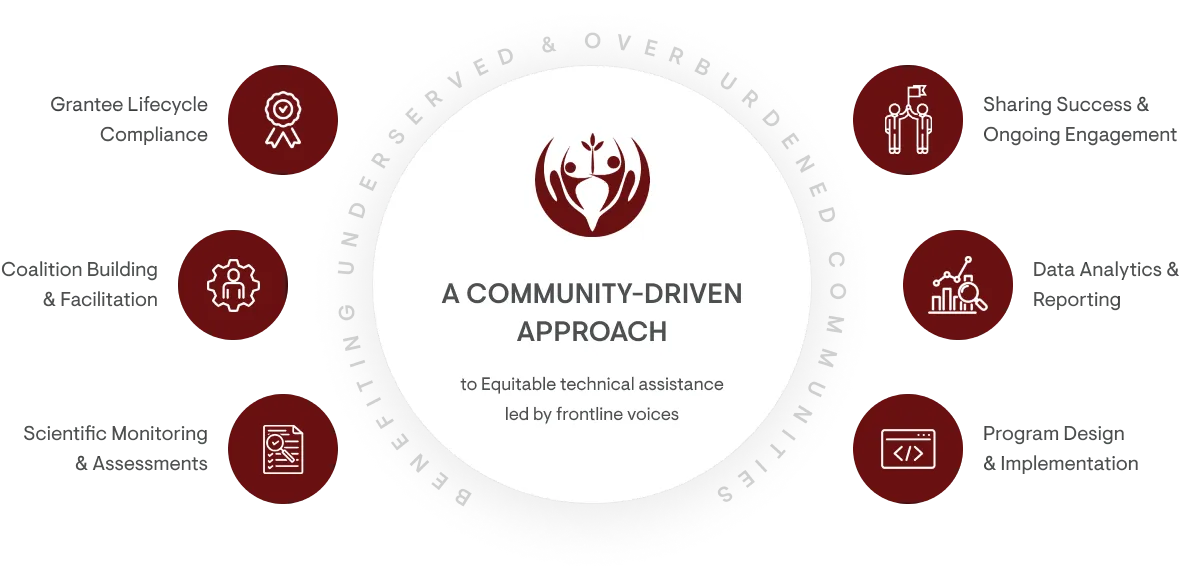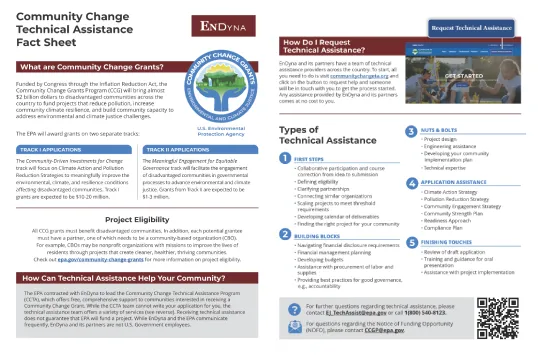EnDyna supports the U.S. government and communities by providing expert technical assistance, fostering inclusive stakeholder engagement, and promoting equitable environmental policies. Our work focuses on addressing the disproportionate environmental and health impacts faced by underserved and historically marginalized communities, while advancing climate adaptation, resilience, and civil rights initiatives.
Achieving Lasting and Equitable Environmental and Climate Solutions in Communities
Technical Assistance Tailored Communities:
Grounded in Equity | Responsive and Respectful | Relevant

Healthy Environments for All
Inequities in environmental conditions continue to affect vulnerable and historically underserved communities across the United States. These disparities stem from socio-economic factors and disproportionate exposure to climate change effects, pollution (including air, water, solid waste, and hazardous waste contamination), and the depletion of natural resources. Many of these communities are located near Superfund sites or areas prone to extreme heat, flooding, and wildfires, further compounding the risks they face. The presence of toxic emissions intensifies these challenges, creating persistent health and safety concerns for those living in these high-risk areas.

Community-Driven Technical Assistance
EnDyna employs an inclusive process that brings together communities, governments, partners, and stakeholders to provide comprehensive technical assistance. Specifically, EnDyna conducts assessments and works to reduce environmental and climate-related risks through active engagement, listening, evaluation, and the development of strategies that drive systemic solutions and long-term resilience. These efforts focus on addressing disparities that impact human health, environmental quality, and economic well-being. EnDyna takes an informed approach to tackling systemic inequities, enhancing environmental resilience for underserved and historically disadvantaged communities, including but not limited to communities of color, Indigenous peoples, LGBTQ+ groups, women, and youth.
Corporate Capabilities

- Assessments
- Communication change approaches
- Education
- Events management
- Outreach and dissemination
- Scientific and management reports
- Specialized technical assistance
- Sustainability Subject Matter Expertise (SME)
- Technical writing
- Capacity building
- Communication strategies
- Community-centered procedural assessment
- Mapping tools
- Program assessments and evaluation
- Scientific research processes
- Stakeholder engagement
- Technical support
- Training and facilitation

Project Experience
EnDyna holds several prime and subcontracts to support the U.S. government in leveraging the transformative potential of the Inflation Reduction Act (IRA). We focus on assisting communities that have been disproportionately affected by climate change, longstanding pollution, and historical underinvestment. Our efforts aim to strengthen community capacity to address environmental and climate-related disparities, enhance resilience, and promote clean energy initiatives.
 Under this prime contract, the EnDyna Team provides comprehensive project planning, development, implementation, and reporting assistance to Eligible Entities for pre-award, award, post-award, and general activities related to the EPA's Community Change Technical Assistance (TA) Program, as codified in Clean Air Act (CAA) Section 138. Additionally, EnDyna offers administrative support and various other services, including grants and program management, grant and contract administration, and other support related to managing, administering, and executing the ECJ Program.
Under this prime contract, the EnDyna Team provides comprehensive project planning, development, implementation, and reporting assistance to Eligible Entities for pre-award, award, post-award, and general activities related to the EPA's Community Change Technical Assistance (TA) Program, as codified in Clean Air Act (CAA) Section 138. Additionally, EnDyna offers administrative support and various other services, including grants and program management, grant and contract administration, and other support related to managing, administering, and executing the ECJ Program.
As the prime contractor, EnDyna excels in developing comprehensive learning materials and activities, including training programs, educational products, and programming content. We also facilitate select meetings to support the integration of Environmental Justice (EJ) and Civil Rights into EPA policies, programs, and activities. Our contributions ensure that these critical components are effectively incorporated and implemented, enhancing the EPA's capacity to address EJ and Civil Rights issues within its operations.
EnDyna will support the EPA's Office of Water in implementing the drinking water and wastewater tribal set-asides by providing targeted Technical Assistance (TA) to tribes. This assistance will focus on developing Bipartisan Infrastructure Law (BIL)-eligible projects, such as replacing lead pipes and addressing PFAS and other emerging contaminants. EnDyna's efforts will align with EPA's March 2023 WaterTA Guidance, integrating these standards into every aspect of the performance work statement to ensure comprehensive and effective support for tribal water infrastructure initiatives.
NEJAC and WHEJAC are conducting advisory meetings to identify, assist, and develop recommendations for the EPA, the White House Council on Environmental Quality (CEQ), and the White House Interagency Council on climate change, economic issues, energy, air pollution, and the integration of environmental justice with other EPA priorities and initiatives. EnDyna supports these virtual and in-person meetings by providing planning and logistics, materials development (name tags, presentation folders), graphic design (posters), lodging and travel arrangements, and IT/web-based support for registration and dissemination.
As a subcontractor to RTI International, EnDyna provides technical assistance for all EPA regions and their stakeholders, including communities, tribes, and other entities. Our support spans various impact areas, such as agriculture, climate planning, commercial and residential buildings, the electric power sector, the industrial sector, low-income and disadvantaged communities, transportation, and waste management. EnDyna's services include administration, planning, hosting technical meetings and webinars, website creation and maintenance, community outreach, managing participant communications, and writing meeting notes. We also offer data analysis on stakeholder engagement and maintain continuous collaborative communications as meetings occur on a rolling basis over several months.
EnDyna coordinated the technical and logistical planning, execution, and follow-up for national training workshops in 2008 and 2009, which reached full capacity. These three-day workshops focused on the CARE competitive grants program, offering innovative approaches for communities to organize and reduce local pollution. The workshops featured 31 sessions, with up to five concurrent sessions at any given time. Topics included environmental justice, children’s health and healthy homes, brownfields development, and tribal issues. Over 200 attendees participated in these comprehensive events.
EnDyna developed the Healthcare Climate Resilience Guide and Resource Packet as part of the President’s Climate Action Plan, released by the National Institute of Environmental Health Sciences (NIEHS) in 2013. This plan recommended actions to enhance resilience in the health sector. EnDyna led a collaborative effort involving inter-agency engagement, non-profit organizations, and key stakeholders. The Guide and Resource Packet are designed for healthcare practitioners and experts to improve resilience against extreme weather events and adapt to new conditions. EnDyna’s subject matter experts assessed whether evolving climate hazards necessitate additional guidance and tools, highlighting the urgent need for climate resilience-specific facility guidance given recent disruptions in the U.S. healthcare sector.
For NIEHS, EnDyna developed the Environmental Justice and Health Implementation Manual for NEPA Practitioners, which integrates health considerations for low-income and minority populations into environmental compliance guidance. This innovative decision-support tool assists practitioners in identifying Environmental Justice (EJ) communities impacted by NEPA activities, evaluating potential health impacts through Health Impact Assessments (HIA), and determining effective engagement strategies with affected communities throughout the process. The Manual provides a comprehensive approach to ensuring that environmental justice and public health considerations are thoroughly addressed in NEPA-related projects.

